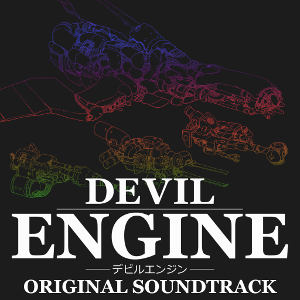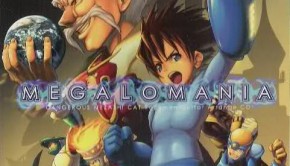Devil Engine Original Soundtrack
 |
Album Title: Devil Engine Original Soundtrack |
| Record Label: DANGEN Entertainment | |
| Catalog No.: N/A | |
| Release Date: March 04, 2019 | |
| Purchase: Buy on Steam |
Overview
Devil Engine is a recently released side-scrolling shoot-em-up, inspired by many of the classics of the 32-bit era. Likewise, the Devil Engine Original Soundtrack, composed primarily by Joseph Bailey (Qwesta), also carries this influence throughout its score. In addition, guest contributions by Mason Lieberman, of the upcoming Renaine, and Hyakutaro Tsukumo, a veteran of the genre known for his work on the Thunder Force series, help round out the score. Does this soundtrack live up to the classics?
Body
With any shoot-em-up, I feel that the first stage theme is key. Without a catchy melody, especially for these games inspired by the classics, part of its heart is already missing. Fortunately, Joseph Bailey’s “Iron Attack” certainly lives up to that expectation. Spacey synths, excellent bass and electronic beats helping to lay the backbone of the piece, and an electric guitar paving the way in the lead melody all help transport the listener back to the eras where titans like Hyakutaro Tsukumo and Manabu Namiki initially made their marks. The tune is incredibly invigorating, features a catchy melody, and is synth rock through and through. If I had heard this without knowing the composer’s name beforehand, I would have assumed it was a veteran of that genre. The other stage themes also offer with it many other styles. In “Jazzy NNYC,” the second stage theme, it’s a jazzier affair, with a saxophone driven melody and synthesized accompaniment. The tempo is decidedly slower and the drum pad work is quite impressive. In addition, there are also some crazy synth solos and an electric guitar bridge that really help veer the tune into more exciting territory. It’s still a solid tune, but I find the A section to be a bit less exciting melodically speaking.
“Crafted Beasts,” the third stage theme, is more akin to the first stage theme. It boasts funky slap bass, FM synth and rock accompaniment, and a fantastic synth melody that, in combination with the other elements in the tune, gives it an incredibly retro feel and a bit of tension in the atmosphere with a heroic bridge that helps break some of tenser atmosphere. The fourth stage theme, “Low Altitude” is another tune where FM synth and synthesizer are at the forefront. When I first heard it, it reminded me of Manabu Namiki’s earlier works stylistically, especially in the B section with its beautiful, softer synths and electric guitar melody. It’s an airy tune that also conjures up a sense of nostalgia. “Distant Call,” the fifth stage theme, is a personal favorite. It is oppressive with its heavy metal influence and gritty accompaniment while the synthesizer melody adds a dramatic flair. It’s intense and atmospheric, but the highlight is certainly the more free-form synthesizer section in the B section that gives off a futuristic feel to it and a prog rock mentality. Lastly, “Ascent,” the final stage theme, is a more atmospheric tune with tense synth hits and hand drum percussion, giving it an ominous sound and is akin to some of the styles one might hear in the early days of the genre.
Of course, every shoot-em-up needs boss music and this one offers them by the boatload. Each stage gets its own unique boss theme. The first boss theme, “Cornered!” exudes tension with its drum pad intensity, synth melody, carnival-like section before the loop, and the bell-like synthesizers used. Unlike many of the early boss themes in the genre, this one is engaging and is full of interesting sections. “Scorched Earth Tactics,” the second boss theme, is, as I wrote in my notes, “FM goodness.” Another tune with intense percussion, synth stabs, a synth choir, and a B section that is super engaging and chaotic, it doesn’t fail to deliver the punch. “At Thunder’s Gate,” the third boss theme, is a metal/synth boss theme. The rock riffs add intensity while the synth melody is nostalgic and super engaging. It is certainly one of the more melodic boss themes. The fourth boss theme, “Celestial Avatar” blends synthesized choir, FM synthesizer, and rock to create a tense, yet beautiful tune with some excellent prog rock keyboard runs and another great melody. “A Grueling Conflict,” the fifth boss theme, is more akin to some of the earlier boss themes on the album. It features chaotic synthesizers, futuristic sound effects, resulting in an ominous and tense tune that is quite oppressive, much like “Distant Call.” However, when it comes to the final boss theme, “Immortal Abstract,” Bailey pulled out all the stops. Sinister organ, warning sirens, a hard techno beat, and chaotic vocal samples come together to create a melodic marvel with a haunting sound that conjures up images of Namiki’s true last boss themes for CAVE mixed with something that would be perfectly at home in a Castlevania game with its Gothic and religious overtones.
Bailey was also responsible for the game’s multiple ending themes, credits theme, and even a remix of Hyakutaro Tsukumo’s “Cosmo Babylon” from Hyper Duel. The three ending themes, “Final Sacrifice,” the first , “Tempered Cruelty,” the second, and “Misotheism,” the third ending theme, all offer different soundscapes. The first is synth rock in approach and offers a bright sound and a fun melody while the latter two are darker in approach. The second ending theme has a more cinematic approach and is ominous and atmospheric with the occasional synth hit, while the third ending theme is ominous, features a heartbeat-like sound and haunting choir. The credits theme, “Contrails,” is a synth rock tune with an airy and catchy melody and the end result is super fun. Lastly, his remix of Tsukumo’s “Cosmo Babylon” is an excellent synth rock cover with organ, an electric guitar lead, with solos, and a wonderful piano section that has a classical feel to it. It’s a modern facelift, but feels still very much retro.
Rounding out the soundtrack are guest contributions by Mason Lieberman and Hyakutaro Tsukumo. Mason Lieberman’s “CHALLENGE MODE” is an invigorating rock tune with jazzy tones, synthesizer accompaniment, and powerful drumming. There is some excellent guitar work and performance present in this piece and it features an exciting melody as well. While it is a bit more modern compared to the soundtrack, it does still retain some classic feel. Tsukumo’s major contributions are the extra stage and its boss theme. “OVER TAKE,” the stage theme, features chugging synth rock with an invigorating synthesizer/guitar melody and percussion accompaniment. In addition, the changes in tempo help provide some musical texture. The boss theme, “METAL OGRE,” is equally intense with its powerful and aggressive drums, synth stabs, and tense and frenetic electric guitar.
Summary
The Devil Engine Original Soundtrack, despite being released in 2019, would be right at home if this game was released during the shoot-em-up genre’s heyday. It is clear that Joseph Bailey is a huge fan of this genre and, while there are certainly stylistic callbacks to games of yesteryear, it is very much his own brainchild, providing a musical journey full of exciting melodies, a retro and nostalgic approach, but with some modern touches as well. Fans of shoot-em-up music will certainly sense the heart and energy that Bailey and the others put into the music. Currently, it can be purchased alongside the game on Steam, but will make it to other music distribution sites in the near future.
Do you agree with the review and score? Let us know in the comments below!
4.5
Posted on March 18, 2019 by Don Kotowski. Last modified on March 18, 2019.











